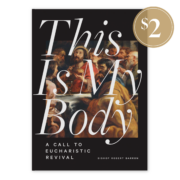Fire up your imagination for a moment and imagine you are standing on a busy street corner with a handful of rosaries. Most people pass by hurriedly, but a stranger walks by and makes eye contact long enough for you to ask a simple question: “What do you think of the Catholic Church?”
What sort of responses would you receive? My guess is that many, if not most, of the responses would be critical of the Church’s moral teachings, especially in the areas of sex, marriage, and human life. Would you be prepared to confidently respond to those criticisms?
Sound arguments often begin with basic facts that one’s interlocutor is likely to agree with. The late Catholic apologist Frank Sheed identifies one such key principle for defending the Church’s moral teachings. He writes, “Our treatment of anything must depend, in the last resort, on what we think it is” (Society and Sanity). This is the first principle we must establish before entering the depths of rational argument. And from that follows another principle on which all moral arguments hinge: Our treatment of man must depend on what we think he is. So then: What are we that makes us so special?

Man Has an Immortal Soul
In his book, In the Beginning, Pope Benedict XVI affirms that the inner unity between faith and reason is reflected in the revealed story of creation and the scientific theory of human evolution. Science can inform us about man’s development as a physical being, but alongside the discoveries of science the disciplines of theology and philosophy can tell us more about man: that he has an immortal soul infused by God. Therefore, man is a unity of body and spirit, which makes him utterly distinct from the rest of creation. “Man is not merely an evolution but rather a revolution,” muses G.K. Chesterton.
With this rational soul, man alone can know by his intellect and love through his will. Unlike the animals, we can freely choose, and we can deliberate before choosing.
Man is a union of body and spirit purposed for heaven.
Another difference is that human souls are incorruptible, which means they are immortal: death of the body is not the end for us. This potentiality to “share in God’s blessed life” for all of eternity sets us apart from animals (CCC 1).
Made like God
In the opening chapter of the Genesis, God says: “Let us make man in our image, after our likeness” (1:26). But what exactly is God like? And what are the particular attributes of God that we similarly possess?
God is infinite and perfect. Therefore, to describe him, we use words such as all-powerful, all-knowing, and all-loving. Although God thereby possesses power, knowledge, and love without limit, we too are able—by virtue of the spiritual powers of our will and intellect—to exercise power, obtain knowledge, and will the good of others, albeit to a finite degree. You can see these “likenesses” to God fully manifested in distinctly human activities, such as artistic endeavors, academic pursuits, and charity work.
But that’s not all. The opening to Genesis also introduces us to a “theology of the body.” The Church, especially through the teachings of Pope Paul VI and Pope John Paul II, teaches us that in our bodies we possess the sexual makeup through which we can enter into free, total, faithful, and fruitful union with another. This nuptial love profoundly images the free, total, faithful, and fruitful relationship between the three eternal persons of the Blessed Trinity.
Saved by God
“Christian, recognize your dignity” commands the Catechism (1691). There is perhaps no better and direct way to recognize your dignity than by looking at a crucifix.
“The life I now live in the flesh I live by faith in the Son of God, who loved me and gave himself for me,” wrote St. Paul (Gal. 2:20). Just as Christ gave himself for Paul, so too did he suffer and die to save you. God desires for all men to be saved (1 Tim. 2:4); and along with God’s desire for all men to be saved is the desire inside every man and woman to be saved. As C.S. Lewis puts it, “He died not for men, but for each man. If each man had been the only man made, he would have done no less.”

Christ’s death on the cross both proves and symbolizes our human worth in addition to God’s undying love for us. We are not only loved by God: we are redeemed by him. We are now free—with the necessary graces readily available—to fulfill God’s original plan for us: to “become partakers of the divine nature” and spend all of eternity in the bliss of heaven.
Back to the street corner
Now, back to that imaginary street corner. Do you feel a bit more prepared to respond to the objections you will undoubtedly encounter? Remember: your objective in that scenario (or any evangelistic situation) is not ultimately to “convert on the spot.” Your task is really to plant little mental seeds for consideration. If you find yourself at a loss for words, then I suggest starting with Frank Sheed’s first principle: that our treatment of anything must depend on what we think it is, from which it follows that our treatment of man must depend on what we think he is.
What is man? Man is a union of body and spirit purposed for heaven. Only from this starting point can the truths about what is right and good for man as man become clear.
This piece was originally published on July 24, 2019, on WordonFire.org.
